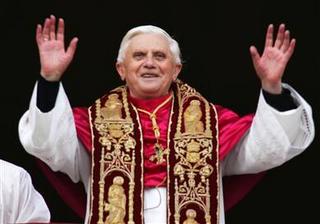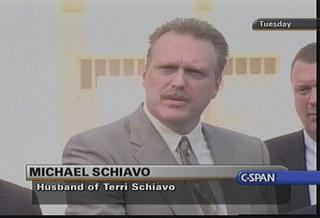[For the audio version of this homily, click here: Fifth Sunday of Easter 2005]
This homily is entitled, “Lessons From A Life Well-Lived.”
The well-lived life I’m speaking of is that of our former Holy Father, Pope John Paul II.
The lessons given by John Paul’s life are definitely for all of us, but today I will apply them specifically to the young people in the congregation. As we all know, our former Holy Father had a tremendous love for the young. That was clearly evident whenever a World Youth Day was celebrated. He inspired young people time and time again with his presence and with his words. And he definitely was inspired and energized by them—even when he was sick.
This homily topic came to mind when I read the first verse of today’s Gospel text from John 14. The setting here is the Last Supper. Jesus has just washed the feet of his apostles, and now he gives them what amounts to his final sermon—what Biblical scholars refer to as his “Last Discourse.”
Jesus begins this farewell teaching with these very powerful words: “Do not let your hearts be troubled. You have faith in God; have faith also in me.”
Our Lord knew that within a few short hours his close friends would be plunged into a terrifying situation. He knew how fear—intense, overwhelming fear—would threaten to lead them into sin and destroy their faith. And so, like a Good Shepherd, he gave them a warning, and urged them not to be afraid.
That, of course, was precisely the message that John Paul II gave to us on the balcony overlooking St. Peter’s Square on
We didn’t know it at the time, but now it’s clear that this was actually a very humble statement on the part of the new Holy Father. Given what he had already done in Poland in openly opposing communism, and given what he would soon do as pope in continuing that fight—and in promoting human rights and the full teaching of the Gospel—he could have come out on the balcony that day and said, in total honesty, “My brothers and sisters in Christ, be not afraid—because I’m not afraid! Follow my example!”
But he was much too humble to do that!
So he simply let his actions verify his words—for over 26 years!
Now his earthly life is complete, his ministry is finished—but his message lives on!
And so, in a certain sense, our former Holy Father continues to say—especially to the young—“Be not afraid!”
“Be not afraid, first of all, to follow Christ!”— “Don’t be afraid to give yourselves completely to Jesus. He has a plan for your life, as he had a plan for mine. Stay close to him, so that you will discover what that plan is.”
“Be not afraid, therefore, to go to Confession.”—“Don’t let Satan keep you away! Don’t be afraid of being faithful to Mass and daily prayer! If you’re going to stay close to Jesus and discover his plan for your life, prayer and the sacraments are essential. That’s what did it for me—especially in my youth, when I suffered the loss of so many of my loved ones. My sister died in her infancy; my mother died when I was only 9; my brother, a young and promising doctor, died when I was 11 after he caught scarlet fever from one of his patients; and my father died in our apartment when I was only 20 years-old. I found him dead one day when I came home from work.
By the time I turned 21, I had no immediate family left on this earth. But Mass and the sacraments and my Catholic faith sustained me during those difficult days and years. They will sustain you too, if you let them—if you take them seriously.”
“Be not afraid to serve others!”—“In one of the Documents of
“Be not afraid to stand up for the truth of your faith.”—“Think of the dangers I faced every day as a bishop of the Church in a communist country. If I could deal with that type of opposition, then you can certainly be true to your Catholic faith in your school, in your workplace, and with your friends.”
“Be not afraid to forgive your enemies.”—“This, after all, is Jesus’ command to us. And yes, I know it’s not easy! Do you think it was easy for me to forgive the man who shot me in St. Peter’s Square in 1981? It was not, but I did it anyway. Do you think it was easy to forgive those men and women—especially in the Catholic Church—who slandered me and openly defied me for the 26 years I served as pope? It was not. But I sought the grace I needed for the task and I forgave them all—joyfully—because it’s always a joy to do what God wants!”
“Be not afraid to say, ‘I’m sorry,’ to those you hurt.”—“In preparation for the new millennium, I spent a great deal of time asking forgiveness—not for the sins of the Church (because the Church as such does not sin)—but rather for the sins of members of the Church throughout the centuries. Some people—even some good people—did not want me to do this. But when you say you’re sorry, it tears down the walls between you and others, and then God can work in beautiful and powerful ways. Did you see how the Lord brought so many people from different backgrounds together for my funeral two weeks ago? In some respects, that was a tremendous miracle—a miracle born of forgiveness.”
“Be not afraid to embrace your cross, and to use your suffering for good.”—“I did not like having Parkinson’s Disease. I did not like the restrictions it put on me. I did not enjoy getting old. I could no longer ski, and hike and kayak and do all those things I enjoyed doing most of my life. I could not be as active as I was in my early years as pope. But I offered it all up to God like a prayer—for the good of the Church and the world. Learn to do the same with your crosses. Don’t waste them.”
And finally, “Be not afraid to die.”—“Our faith tells us that physical death is not the end. Jesus reminded us of that truth in today’s Gospel when he said that in his Father’s house there are many dwelling places. So live the Gospel, remain in the state of grace, and you have nothing to fear. Remember the words I spoke to my personal secretary just before I died: ‘I am happy, be it yourselves as well.’ May you be able to say those same words when your time comes to meet the Lord face to face. You will then have peace.”
These, my brothers and sisters, are some of the most important lessons given by this extraordinary “life well-lived.”
Let pray today that all of us—young and old—will learn these lessons, and live these lessons, and then someday live forever with the incredible man, Pope John Paul II, who taught them to us.
John Paul II with the young people he loved so much.






